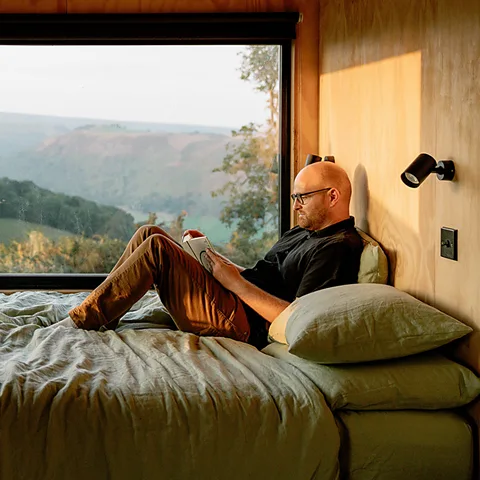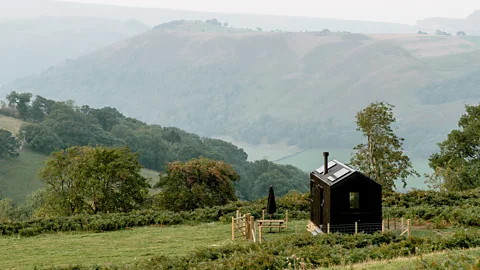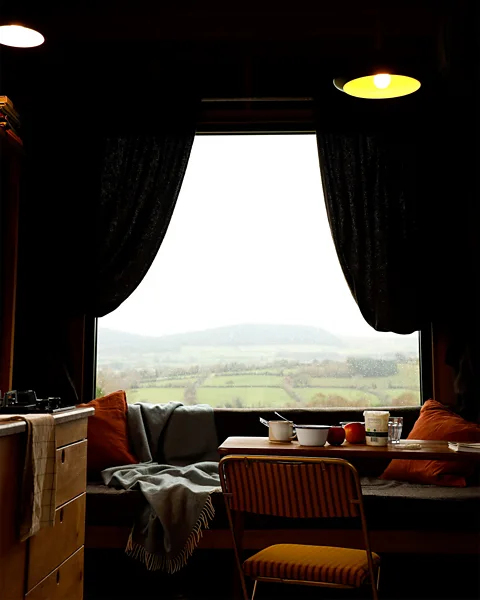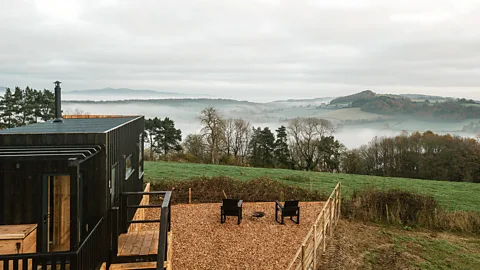The unstoppable rise of digital detox retreats
 Adam Firman
Adam FirmanIt's not just a White Lotus thing: A growing number of resorts and retreats are asking their guests to put their digital devices away during their stay.
When Ophelia Wu went to Eremito in Italy she was hoping for a stress-free experience. "I was living a hectic life in London, and I found it overwhelming," she said. "I needed a break. I heard about this former monastery in Umbria, and I was curious about it."
She booked a three-night stay at the hotel, which has no wi-fi or phone signal, no tech and no TVs; just brick walls, basic bedrooms and candlelight. The buzz of bumblebees replaced the buzz of her notifications.
"When I left, I was reluctant to turn my phone back on," she said. "I got used to the peace of being unbothered and the lack of urgency."
She's not alone: offline travel is one of the trends of the year so far. According to the 2025 Hilton Trends Report, 27% of adults planning to travel say that they intend to reduce social media use during their holidays. Echoing this interest, global luxury home-rental platform Plum Guide has seen a 17% rise in searches for unplugged, tech-lite properties. In Mexico, the luxury Grand Velas Resorts has launched a Digital Detox Program that would not be out of place on The White Lotus, complete with a "Detox Concierge" to whisk away all electronic devices on arrival.
What's striking about this trend is that it's available to everyone, it costs nothing and it's about giving less. It seems that people have become so dissatisfied with digital life that they are willing to pay more to escape it.
 Adam Firman
Adam FirmanWhile it has become the norm to use tech to facilitate travel logistics – bookings, check ins and itineraries – when it starts to play a starring role in the holiday experience, it can feel like the opposite of getting away from it all. According to It's Time To Log Off, the average person spends a day each week online, and 34% of people have checked Facebook in the last 10 minutes. Sixty-two percent of polled adults, they say, "hate" how much time they spend on their phones.
Well World
BBC Travel's Well World is a global take on wellness that explores different ways that cultures the world over strive for a healthy lifestyle.
Martin Dunford is the founder and CEO of Cool Places, a website that has curated hotels, B&Bs, pubs and self-catering accommodation across the UK since 2012. "We used to have a tag to show which properties had wi-fi," he said. "Now we're adding a 'no wi-fi' tag."
His site lists 34 places to enjoy a digital detox stay, from a Cornish eco-yurt to a boathouse on Ullswater in the Lake District, and the list is growing. Intrigued by the interest in stays where guests can disconnect, Dunford has been working with the University of Greenwich and the University of East Anglia to analyse what happens to people when they go offline on holiday. They found a distinct pattern:
"Guests go stir crazy in the first 24 hours," he said. "But after 48 hours they are well adjusted and start getting into other activities. At the end of a three-day stay – or longer – we find guests may be happy to have their phones back or can be a bit take it or leave it about it."
You might wonder why anyone needs to book a special holiday to get off their phones: can't they just unplug themselves? But, as that difficult first 24 hours experience shows, it's not so simple: habits are hard to break, and digital addiction is particularly tough. When university researchers investigated digital-free tourism in 2019, they discovered that many travellers experienced anxiety and frustration initially, but these emotions led to acceptance, enjoyment and liberation over time. Without having a boundary put in place by an external figure or taking away the option to use screens, those positive feelings might not have been reached at all.
 Jasmine Hughes
Jasmine HughesAn hour from Dublin in idyllic rural Ireland, Rosanna Irwin knows all about tech overload. She's the owner and founder of Samsú, a series of off-grid cabins in the Irish countryside, a growing business that she set up in 2024 as a reaction to her experiences leading a chronically online life.
"I started my career at Facebook," she said, "and I was working all hours with global teams, replying to all messages, in systems where we had 'unlimited holidays' – which really meant it was harder to justify taking a day off. Ultimately being online all the time like this really broke me."
It took a trip to the quiet island of Samsø in Denmark for Irwin to see what happens when you must switch off.
"I spent three days with no internet there and came home feeling cured," she said, "I quit my job, moved back to Ireland and spent the next eight months working on this idea. I felt this strong gut instinct to do it – and I hadn't listened to my gut for a long time."
Irwin now operates two cabins, each within a 90-minute drive of an Irish city, with three more due to open this summer. In each simple space there is no wi-fi or technology, so the only tweets guests will hear are from the birds. Board games, books and a radio are provided, and the cabins come with simple cooking facilities. In case of emergency, every cabin has a phone, but it's a special, stripped back version, preloaded with podcasts and music but very little else.
 Jasmine Hughes
Jasmine Hughes"We're not only getting people offline," Irwin said, "we're also encouraging them to discover their creativity and mindfulness. We will be launching a cookbook this summer with one-pot recipes and foraged ingredients to give people an extra purpose as well."
Five more digital detox retreats to consider:
The Offline Club: Two and five-day digital detox retreats in the Netherlands and France, as well as offline hangouts and events bringing people together in phone-free events.
Swallowtail Hill: An East Sussex farm that champions outdoor adventures and runs a special childrens' off grid experience where storytelling and marshmallow-toasting around the fire replaces screen time.
Morromico Lodge, Columbia: A wi-fi-free eco-lodge with hammocks, rainforest and snorkelling – and without a digital distraction in sight.
Careys Manor Hotel: This Hampshire spa hotel offers a tech-free themed spa break, with a phone amnesty box in the bedroom.
The Global Retreat Company: This international platform brings together a multitude of digital detox destinations, from offline yoga retreats to no-phone surf camps.
Hector Hughes is a co-founder of Unplugged, a group of 40 tech-detox cabins in the UK and Spain. His business is also seeing growth: they expect to have 60 cabins by the end of the year. His journey, with his co-founder Ben Elliott, mirrors Irwin's: burnout and dissatisfaction in a start-up career, leading to an epiphany while on a break from tech.
"I was at breaking point in 2019," he said, "and I went on a retreat to a Buddhist temple in the Himalayas. I was without my phone for 10 days. I had never had a break like it before."
He returned home, quit his job and decided to create a tech-free option like a retreat, but decoupled from religion and philosophy.
"So much of it is really about getting offline and getting into nature," he said. "Just being offline for three days can have a profound effect on you. You feel a deep sense of calm at the end – it's quite surreal."
More like this:
• Ireland's time-warped island of Owey is the perfect place to disconnect
The Unplugged experience offers modern solar-powered Scandinavian-style cabins in rural locations such as the green fields of rural Cheshire, a dark sky reserve in Exmoor and in the forested mountains of the pre-Pyrenees in rugged Catalonia. Inside, there are blankets, board games and a lockbox for devices – so guests must stay strong and lock their devices away themselves. Unplugged's mission is to make it aspirational to have time away from your phone, and to feel good about doing it.
He's seen some interesting results so far: "People come away looking 10 years younger," he said, "and couples in particular are more connected. If you've been together for a decade, you've probably never had a day together without a phone. The experience offers you an intense connection you might not have experienced before."
 Adam Firman
Adam FirmanWhile Hughes and his team are on a mission to make being offline an aspirational experience, Dunford thinks it could be a regular one.
"The detox holiday is an inevitable backlash against our hyperconnected world," he said. "But in time, it might not be that unusual. Maybe being away without wi-fi on holiday will become the norm?"
--
If you liked this story, sign up for The Essential List newsletter – a handpicked selection of features, videos and can't-miss news, delivered to your inbox twice a week.
